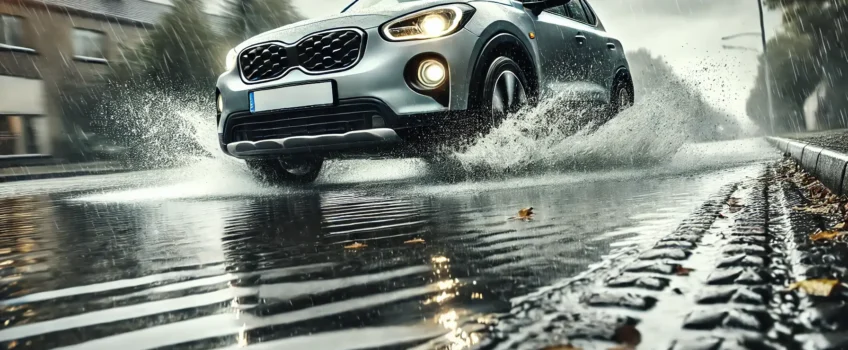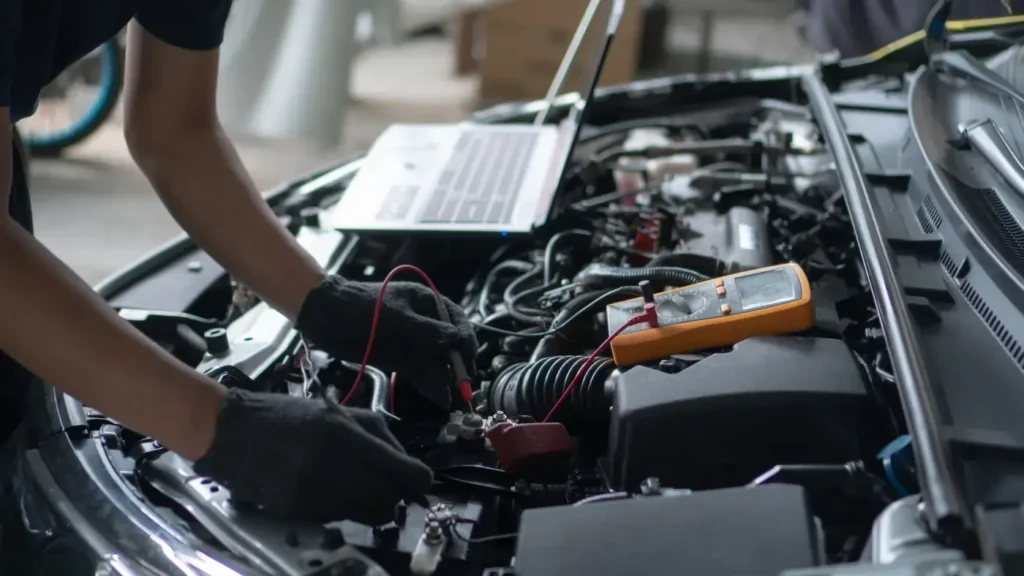
Water Damage in Cars: How to Protect Your Vehicle’s Electrics from Puddles, Flooding, and More
Water damage in cars is a concern every driver should take seriously, especially in the UK, where wet weather is a regular part of life. While water damage can affect various parts of a vehicle, its impact on a car’s electrical systems can lead to significant and costly problems. From minor glitches to major malfunctions, water exposure can have far-reaching effects on a car’s wiring, sensors, and components. In this guide, we’ll cover everything you need to know about water damage in cars, including common risks, preventive tips, and what to do if your vehicle encounters water-related issues.
Why Water Damage in Cars Is a Major Concern
Water-related issues pose risks to mechanical parts and also to essential electrical systems. Car electrics, which include the battery, sensors, and ECU (engine control unit), play a vital role in how a car operates. When these parts come into contact with water, they can corrode, short-circuit, or fail, leading to costly repairs and potentially unsafe driving conditions.
In the UK, unexpected weather events such as heavy rain, road flooding, and deep puddles increase the likelihood of water exposure. But it’s not only extreme weather that causes water damage in cars. Regular driving through puddles or parking in areas prone to damp conditions can also have a long-term impact on your car’s electrics. Addressing water damage in cars promptly and understanding how to prevent it can save time and money in the long run.
Related: How to Drive Safely in Winter
The Impact of Water Damage to Electrical Components in Cars
Water damage in cars can impact various electrical components essential for the vehicle’s safe operation. Understanding which parts are most vulnerable to water exposure can help drivers take precautions to protect their vehicles.
Wiring and Connectors
The wiring in cars is extensive and often hidden within the chassis, which can trap water if exposed. Corrosion on metal connectors from moisture can disrupt circuits, leading to system malfunctions and even complete failure of certain electrical functions.
Battery and Alternator
Water damage in cars often affects the battery and alternator, particularly if moisture seeps into the engine bay. This can lead to corrosion on battery terminals, reduced battery life, and issues with the vehicle’s charging system.
Sensors and ECU
Modern vehicles rely heavily on sensors to communicate with the ECU, which regulates essential functions. If water reaches these sensitive components, it can short-circuit them, causing dashboard warning lights and potentially compromising engine performance.
Damage to any of these parts due to water exposure can lead to both immediate and long-term issues, making prompt action and regular checks crucial in preventing extensive water damage in cars.
Common Causes of Water Damage in Cars
Water-related issues can occur in many everyday situations, especially given the UK’s frequent rainfall. Knowing the risks can help drivers take preventive action before costly damage occurs.
Driving Through Puddles and Flooded Roads
Driving through seemingly harmless puddles can quickly turn into a problem if water splashes into the engine bay or undercarriage, where sensitive electrical systems are located. Water damage in cars is especially likely for low-clearance vehicles, as they are closer to the ground and more exposed to water on the road. It’s generally recommended to avoid driving through water that rises above the wheel arches, as this height can easily reach critical electrical parts like the battery and alternator.
During heavy rain, puddles can hide the true depth of the water, leading drivers to unknowingly submerge sensitive parts. Avoiding unknown puddles and taking alternative routes during storms is one of the simplest ways to prevent water damage in your car.
Parking in Flood-Prone or Low-Lying Areas
Where you park your car can also influence the risk of water damage. Parking in low-lying areas or underground car parks during heavy rain increases the risk of exposure to standing water. If even part of the vehicle is submerged, water can reach the car’s undercarriage, compromising electrical connections and causing corrosion. Parking in safer, elevated areas or at facilities designed to prevent flooding is an effective way to avoid water damage in cars.
Recognising Signs of Water Damage in Car Electrics
Identifying water damage in cars early can prevent further complications and costly repairs. Here are some signs that water exposure may be affecting your car’s electrics:
Dashboard Warning Lights and Faults
One of the first signs of water damage in cars is the appearance of dashboard warning lights. Modern vehicles rely on sensors to monitor vehicle performance, and water can interfere with these sensors, causing false warnings or malfunction alerts. If warning lights appear after driving through water or heavy rain, it’s essential to have your car checked as soon as possible to determine the root cause and avoid more severe issues.
Electrical Glitches and Malfunctions
Water damage in cars can lead to various electrical issues, such as flickering headlights, unresponsive buttons, or malfunctions in infotainment or climate control systems. Corroded connections can result in intermittent issues, making it difficult to pinpoint the problem. If you notice any unusual behaviour in your car’s electrical system, inspect or have a professional check the wiring and connectors to prevent further damage.
Corrosion from water exposure can also develop over time, causing issues that may not be immediately apparent. Regular inspections and prompt repairs can help catch these hidden issues before they lead to more extensive water damage in cars.
Recommended: What Does Preventative Maintenance Include and Why is it Important?
Steps to Take If Your Car Has Experienced Water Exposure
If your car has been exposed to significant water, knowing the correct steps to take can make a difference in preventing further damage to your car’s electrics.
Immediate Actions for Water-Exposed Vehicles
If you suspect water damage in your car, avoid starting the engine. Starting the car can cause short circuits or damage to electrical components that may still be wet. Instead, check for visible signs of moisture in the engine bay or interior and, if necessary, contact a professional for guidance.
Visit a Specialist for Diagnostics

Professional diagnostics are essential for assessing water damage in cars. Technicians trained in electrical diagnostics can perform a comprehensive inspection to check for hidden water damage and identify any affected electrical components. Elite Garages, for example, offers thorough diagnostics for cars exposed to water, ensuring peace of mind that your car is safe for the road.
Recommended: What Does Car Diagnostics Include?
Preventing Water Damage in Cars: Practical Tips
The best way to deal with water damage in cars is to prevent it from happening in the first place. Here are some preventive measures every driver can take:
Avoid Driving Through Deep Puddles and Standing Water
One of the simplest ways to avoid water damage in cars is to steer clear of puddles and flooded roads whenever possible. This is especially important for low-clearance vehicles, which are more vulnerable to water splashing into the undercarriage or engine bay. Taking care during rainy days and choosing safer routes can go a long way in protecting your car from water-related issues.
Check Seals and Perform Regular Maintenance
Ensuring your car’s seals are in good condition can also help prevent water damage. Check door, window, and boot seals regularly, as worn or cracked seals can allow water to seep into the car’s interior, where it can affect electrical systems. Routine maintenance and inspections will help you catch potential issues early. Elite Garages provides thorough checks and advice on maintaining your car’s condition during wet weather.
Why Choose Elite Garages for Water Damage and Electrical Diagnostics?
When it comes to water damage in cars, Elite Garages offers reliable expertise in electrical diagnostics and repairs. With a team of trained car technicians experienced in identifying and repairing water-damaged components, Elite Garages can help ensure your vehicle is safe and reliable after any exposure to water.
At Elite Garages, our services include detailed diagnostics that can detect water damage, ensuring that no part of your car’s electrical system is overlooked. Our technicians are also on hand to provide helpful advice on preventive measures, giving you the knowledge to keep your car safe in the UK’s unpredictable weather.
Trusted Experience and Industry Knowledge
Water damage in cars is a significant risk that can lead to costly repairs if not addressed. By understanding the potential dangers, recognising early signs, and taking preventive action, you can protect your car’s electrics from the UK’s rainy weather. For expert diagnostics and guidance, visit Elite Garages, where our team is dedicated to helping you keep your car dry, safe, and road-ready.
With years of experience in car maintenance, Elite Garages understands the unique challenges of water damage to car electronics. Whether it’s diagnosing electrical faults, recommending preventive steps, or repairing affected systems, our team has the skills and knowledge to keep your car in optimal condition.
For more interesting and helpful information about all things automotive, including water damage in cars and how to prepare your car for winter, read our blog and follow us on social media!
FAQS:
Click the + to read any answer or visit our most FAQ page to review the most frequently asked questions across all our Elite Locations.
If you click on a ‘Category’ or ‘Tag’ link, the page will ‘refresh’ and reload the page showing the top of the page first, you’ll then just need to scroll down to the FAQ section to see the results for the Category or Tag you selected.
If your car has been exposed to water, avoid starting it, as this could lead to short-circuiting. Check for signs of water in the engine bay, undercarriage, or cabin. It’s best to have a professional perform a thorough diagnostic check, as water damage may not always be visible immediately. A trusted technician can inspect your vehicle’s electrics and advise on any necessary repairs to prevent long-term damage.
To prevent water damage during heavy rain, avoid driving through puddles and flooded areas, especially if the water level is near your car’s wheel arches. Park in elevated areas or covered facilities when possible, as low-lying spots are more prone to flooding. Regularly check and maintain seals around doors, windows, and the boot to keep water from entering your car’s interior and affecting sensitive electrical parts.
Yes, water damage can severely impact your car’s electrical system. When water enters areas with wiring, sensors, or components like the battery, it can cause corrosion, short circuits, and malfunctions. These issues can lead to dashboard warning lights, unresponsive electronics, and even engine performance problems. If you suspect water damage, it’s essential to have your car’s electrics checked by a professional to prevent costly repairs. Book your car diagnostics at Elite Garages.
Car diagnostics are essential for identifying hidden water damage in a vehicle’s electrical system. By running a comprehensive diagnostic check, mechanics can pinpoint issues like corroded connectors, short-circuited sensors, and malfunctioning components, even if they’re not visibly affected. Diagnostics provide detailed insights, allowing mechanics to address specific areas impacted by water, ensuring the car remains safe and preventing further electrical issues down the line.
About Us
Opening Times
Saturday : 8:30–4:00
Sunday : closed
More Information
Contact UsCustomer Information Pack
Check MOT Due Date
Free MOT reminder
Careers


